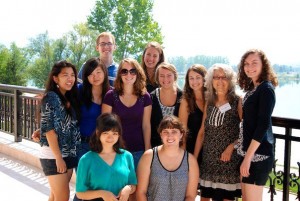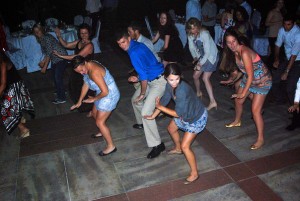There’s a reason this post is not titled “How to Write the Perfect Fulbright Application.” I cannot tell you the secrets of THE perfect Fulbright app, because a successful application, I suspect, is less about being the Best. Applicant. Ever and more about making a convincing argument that you and your country of choice would make a productive partnership. Here are some ideas for how to craft your own best application.
• Spend time picking the right country for you. You can read about my country-choosing process here, or Adelina Solis ’11 perspective in this post.

We all came for different reasons… but no one came because they were already fluent in Bulgarian. Half our ETA cohort and our language teacher, Diana, in Beginning Bulgarian Language. Fulbright International Summer Institute, 2012.
• Don’t be afraid to take questions to the Fulbright Program Adviser or other staff on-campus. They are busy people, so respect their time and make sure your question hasn’t already been answered on the Fulbright or Scripps websites.
• The Off-Campus Study office keeps binders full of successful Fulbright applications. Do spend time reading them. I went back a couple of times. I found it helpful to take notes and write down ideas I had as I was reading. Take notice of what people list under publications, awards, abstract, and future career goals. No one will tell you how exactly to write these sections, but you may find ideas for what to include and how.
• If you’ve been abroad before, or have previous teaching experience, think about the moments that have stuck with you. Because Fulbright’s mission is to foster mutual understanding, moments that focus on cultural or interpersonal exchange may provide good anecdotal fodder for personal statements.
• If you have a side project, craft it to be mutually beneficial for your country and yourself. If I stayed inside writing science fiction all day, I wouldn’t be interacting much with the culture. With a travel writing focus, I practice my writing, interact with the country, and hopefully help others interact with Bulgaria as well. Other ETAs here plan to volunteer at orphanages, teach music to Roma kids, and practice cartography in their placement cities; use something you’re passionate about.

Cultural exchange can be as simple as teaching Bulgarians the “Wobble.” Fulbright International Summer Institute, 2012.
• Finish at least one draft of your personal statements and grant purpose in time to have the Writing Center take a look. Taking criticism can be hard, for these personal essays even more so than with academic essays (I cried, and I doubt I was the first to do so). The Writing Center staff is there to offer support and constructive feedback. Their ideas can lead to fruitful revision, but it means being vulnerable and open to suggestion.
• Be honest in your application essays. I mention it, because it’s important that you know your essays may be used not only to decide whether or not to award you the Fulbright, but may also determine (in the case of ETAs) where in the country you’ll be placed. It might be a matter of where your side-project (if you have one) will best be completed, or where your hobbies might be accomplished. My own essays mentioned Bulgaria’s natural beauty and my semester learning Balkan Dance. My placement is in Bulgaria’s most beautiful mountain range, and my predecessor took Bulgarian Dance classes at the community center. Coincidence? Nope.
• Make sure you can articulate to yourself WHY you want to do this, WHAT you’ll get out of it, HOW you’ll approach various aspects of the grant (language learning, culture shock, teaching), and ANY reservations you have. Figure out how to address these questions before talking to faculty recommenders, and certainly before your interview. If you’re confident in yourself, they will be confident in you too.
• If you need a neurotic online community, check out the Fulbright thread on the Grad Café forums. I appreciated knowing that the anxiety was not mine alone.
These are my tips for navigating the Fulbright application process. I’ll admit they are biased towards the ETA application, where I have experience. What suggestions would you add to this list?
